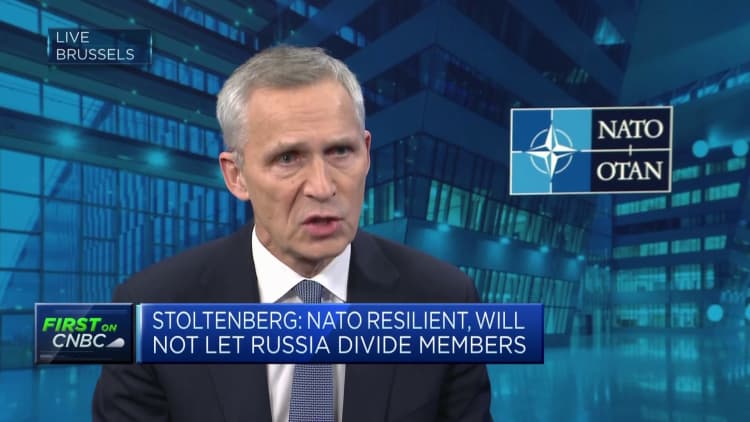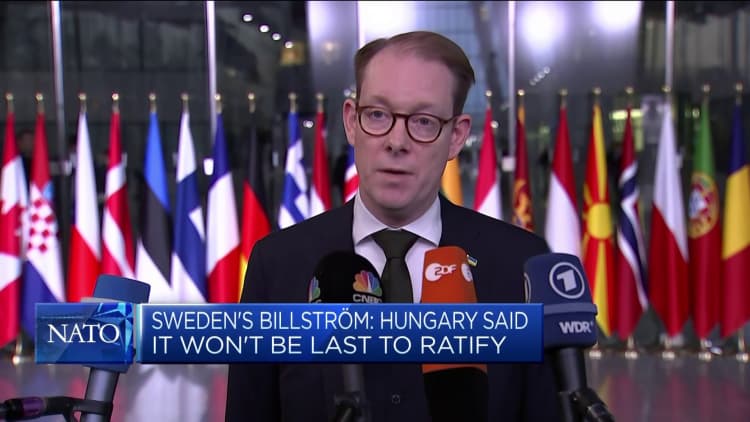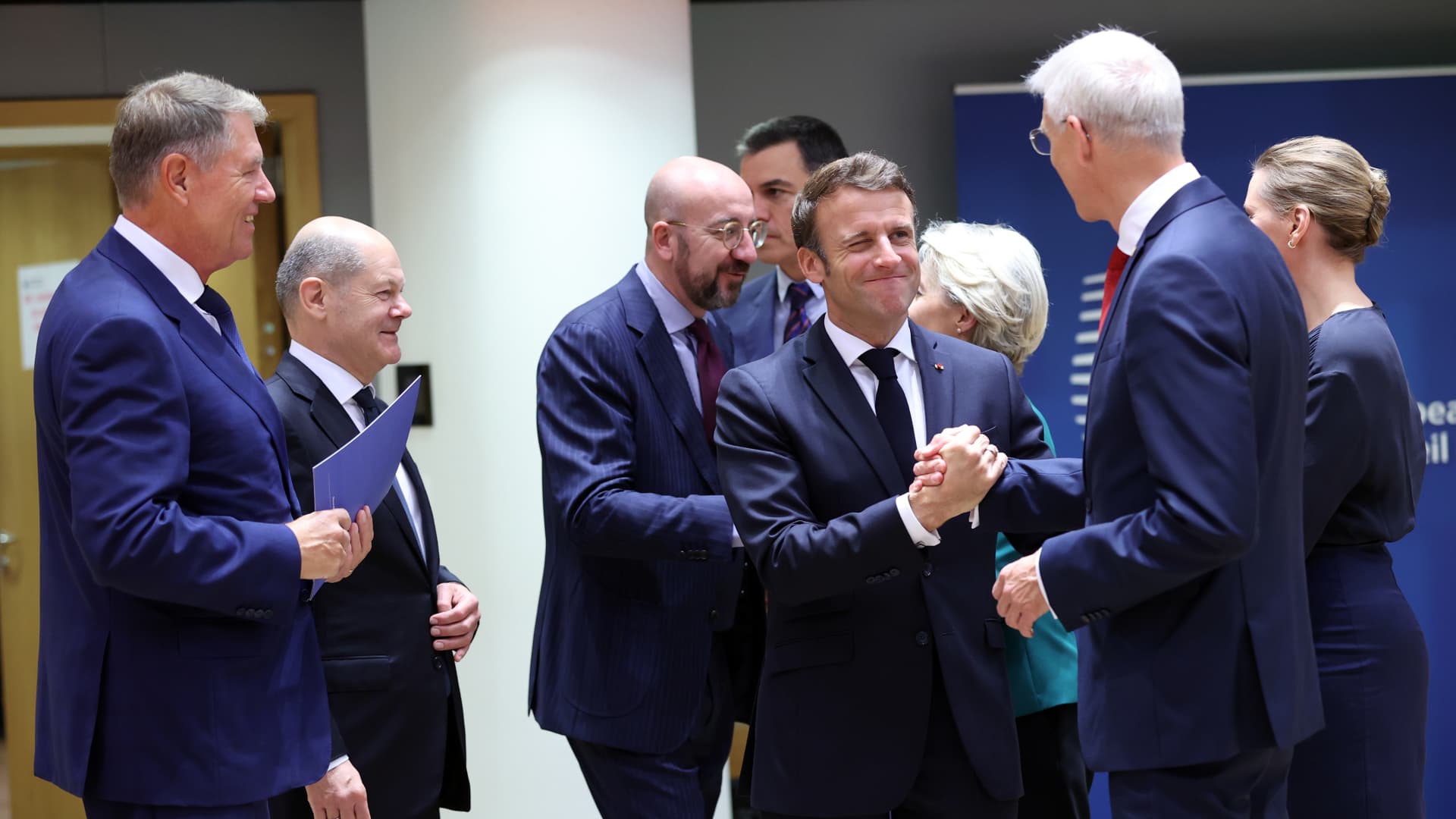French President Emmanuel Macron (C-L), President of the European Commission, Ursula von der Leyenââ (Rear 2nd R), Prime Minister of Spain, Pedro Sanchez Perez-Castejon (Rear), President of Romania, Klaus Iohannis (L), Chancellor of Germany, Olaf Scholz (2nd L), and European Council President Charles Michel (3rd L) attend day two of the European Union (EU) leaders summit at the European Council headquarters in Brussels, Belgium, on October 21, 2022.
Dursun Aydemir | Anadolu Agency | Getty Images
For most of the 21st Century, the world’s relative order has been maintained by a combination of the United States-led economic and political institutions, the rising role of China, and the counter-balancing effect of Europe, with its strong economic ties not only to the U.S. and China but also to numerous other countries and regions such as Russia and the Middle East.
However, ever since the retirement of former German Chancellor Angela Merkel nearly two years ago in December of 2021, the lack of a leading global role for Europe is increasingly felt in all regions.
The Russian invasion of Ukraine only three months later served to provide an immediate driver for greater political unity within Europe. At the same time, however, it proceeded to further isolate Europe as a political leader, not only in its relationship with Russia, but more importantly, with China and with much of the non-aligned world.
Although efforts have been made to establish a cohesive and leading role for Europe in areas such as trade, economic development, and even regional tensions such as the recently erupted Israel-Hamas conflict, the lack of a clear European leader on the international stage is creating a significant void.
For the world, the global post-war order and its institutions have increasingly come under attack. China, Russia and even the United States under Donald Trump have expressed dissatisfaction with institutions such as the World Trade Organization, the G7 and the United Nations.

The void is particularly apparent at the WTO, where the lack of European leadership on trade as the U.S. turned inward is particularly felt. The push for free trade, in particular, took a significant hit with the U.K.’s Brexit vote in 2016. The subsequent negotiations made trade between the EU and one of its largest former members take a significant step toward bureaucracy and protectionism which served to turn Britain largely inward and away from a leading global role.
Perhaps nothing shows the consequences of the lack of European strength in preserving these institutions than the Russian invasion of Ukraine. President Vladimir Putin directly referenced Ukrainian aspirations to join the EU and NATO as significant factors in the necessity for the conflict.
Germany in particular was hamstrung in its prior role in helping to engage Russia. Where previously, German demand for Russian natural gas was seen as a significant tool for engagement and peace, Russia instead used the gas supply as a threat to discourage German involvement. Ironically, when Germany did align with other EU members and Britain against the invasion, the cutoff of that Russian gas actually further diminished its economic leadership due to a decision made by Merkel back in 2011 after Fukushima to implement a stalled plan to remove Germany’s nuclear reactors and rely on Moscow for natural gas.
The significantly higher energy prices and diminished German economic prospects have placed the European economy at a disadvantage compared to rising powers such as India and Southeast Asia.
Engagement with China as an equal partner separate from the United States has also suffered. Previously, Europe could rely on a robust demand for its products in China, especially German cars, to help give it a separate channel for negotiations. However, the combination of a split over Ukraine, and internal divisions within Europe, have prevented any way for Europe to play a key role with China.
Nowhere was this more apparent when European Commission President Ursula von der Leyen and French President Emmanuel Macron made separate visits to China last April which the Chinese were able to use to play up European divisions, especially at home. Even a planned EU summit with China next month is coming on the heels of a much more heralded visit by President Xi Jinping to the U.S. for the APEC Summit, where Europe was very much on the sidelines.
With the ongoing instability in the Middle East and Africa, the lack of a clear European position and ability to engage as a third-party broker is apparent. The internal divisions in many European countries over Hamas’ terrorism and the resulting Israeli bombardment and its civilian casualties is paralyzing Europe, rather than giving it reasons to be publicly able to engage both sides, or even make a unified call for a cease-fire.

The result has been offers by China to engage with and mediate in the region as well as a reliance on regional states such as Qatar to serve as an in-between. Meanwhile, France has found itself outmaneuvered in many of its West African relationships by a Russia who is eager to peddle influence through arms and energy sales, as well as supporting governments with military actions.
The world needs a more engaged Europe, and one which can act as a unified force on the world stage.
Even as the balance of power economically shifts to places such as India, Indonesia, Saudi Arabia, and others, the instability of this multipolar world needs Europe to help play a key role in the here and now.
Kevin Klowden is the chief global strategist at the Milken Institute.

